| Srl | Item |
| 1 |
ID:
188286
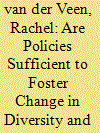

|
|
|
|
|
| Summary/Abstract |
This article examines whether policies alone are sufficient to foster change in diversity and inclusion in the Australian and New Zealand intelligence sectors. It considers the diversity and inclusion policies of Australian intelligence agencies as well as applicable legislation regarding employment and nondiscrimination, as the legislation informs policy and is intended to reflect societal values. By comparing the Australian and New Zealand approaches to diversity and examining the successes and failures of their differing policies, this article reveals which policies have been most effective in fostering change in representation and equality and proposes alternative solutions based on other diversity and inclusion practices, such as mentorship, sponsorship and parenting outreach programs, and flexible working options.
|
|
|
|
|
|
|
|
|
|
|
|
|
|
|
|
| 2 |
ID:
166102
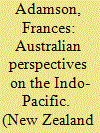

|
|
|
|
|
| Summary/Abstract |
Frances Adamson outlines Australia’s approach to regional co-operation and relations with New Zealand.
|
|
|
|
|
|
|
|
|
|
|
|
|
|
|
|
| 3 |
ID:
151929
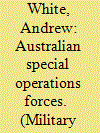

|
|
|
| 4 |
ID:
085402
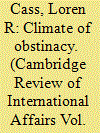

|
|
|
|
|
| Publication |
2008.
|
| Summary/Abstract |
Despite sharing a large number of attributes, Canada and Australia's foreign policy positions in international climate negotiations have varied significantly. Given the similarities in variables affecting climate policy, how do we explain the variation in foreign policy responses to climate change between the two countries? Rational choice and domestic political analyses have failed to fully explain the observed variation. National responses to climate change in Australia and Canada appear to be significantly shaped by ideational forces as well. In particular, political leaders have pursued symbolic climate policies to cultivate national identities for two distinct audiences-international partners and domestic voters. International climate policy positions have been frequently used as communication tools by both states with the resulting climate positions bearing little relationship to each government's domestic climate policies. The Australian and Canadian cases raise important questions regarding the relationship between foreign policy commitments and related domestic policy reforms, which have substantial implications for the effectiveness of global efforts to address climate change.
|
|
|
|
|
|
|
|
|
|
|
|
|
|
|
|
| 5 |
ID:
147965
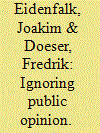

|
|
|
|
|
| Summary/Abstract |
This article investigates why the governments of Australia and Poland decided to contribute military forces to the United States led invasion of Iraq in March 2003 when a majority of Australian and Polish citizens were opposed to national involvement in the invasion. The objective of the article is to increase understanding of the conditions under which governments ignore the public in their foreign policymaking. The article examines the explanatory power of four intervening variables: issue salience, elite debate, timing of the next election and the importance assigned to international gains by the government. On the basis of the Direct Method of Agreement, the article concludes that government perceptions of international gains and the timing of the next election were potentially necessary factors for the outcomes of the cases, while issue salience and elite debate were not necessary conditions. A distant election may, thus, provide sufficient electoral protection for a government that conducts a foreign policy to which the public is opposed.
|
|
|
|
|
|
|
|
|
|
|
|
|
|
|
|
| 6 |
ID:
086174
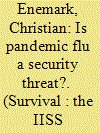

|
|
|
|
|
| Publication |
2009.
|
| Summary/Abstract |
Most infectious diseases do not attract heightened political attention because their effects are mild, they are familiar to physicians, or their geographic occurrence is limited. A particular disease might be deemed a security issue, however, when its effects impose or threaten to impose an intolerable burden on society. That burden can be measured in terms of morbidity and mortality, but also in terms of the way in which a disease is perceived by those who fear infection. The disease described by the World Health Organisation (WHO) as 'the most feared security threat' today is pandemic influenza.The next pandemic could cause illness and death on a large scale, over a wide area, in a short space of time. Such a prospect arguably sets this disease apart from the many others that may be regarded simply as health issues, and some Western governments have started to frame pandemic influenza as a threat to national security. According to the US pandemic plan, a 'necessary enabler of pandemic preparedness' is that this be viewed 'as a national security issue'. The 'National Security Strategy of the United Kingdom' assesses an influenza pandemic as the 'highest risk' civil emergency. And under the Australian pandemic plan, which emphasises 'maintenance of social functioning', Australians are to receive the best possible health care 'commensurate with the maintenance of a safe and secure society'.
|
|
|
|
|
|
|
|
|
|
|
|
|
|
|
|
| 7 |
ID:
191825
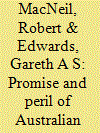

|
|
|
|
|
| Summary/Abstract |
After nearly a decade of policy inaction by the Abbott/Turnbull/Morrison Coalition governments, the election of Anthony Albanese’s Labor government has ushered in expectations of a sea-change in Australian climate policy, one that might allow the country to finally emerge as a global leader on the issue. Yet while years of inaction have left some relatively easy victories for the new government to rack up, the change of leadership and rhetoric obscures some key continuities in the Albanese government’s approach that need to be foregrounded and critiqued by domestic and international audiences alike. In this brief commentary, we consider what the new Labor government might mean for Australian climate action over the coming years. We focus, in particular, on the role that fossil fuel exports will continue to play in overwhelming any emissions cuts achieved domestically, and underscore the need for a much broader and more ambitious national climate strategy designed to wean the country off its reliance on coal and gas revenues.
|
|
|
|
|
|
|
|
|
|
|
|
|
|
|
|
| 8 |
ID:
139010
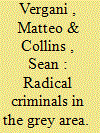

|
|
|
|
|
| Summary/Abstract |
This article defines and assesses the ideal-type of the radical criminal as the analytical framework for a comparative qualitative study of Mexican religious drug cartels and Australian outlaw motorcycle gangs and concludes that radical criminals operate in both weak and failed states and stable democracies. The article participates in the wider discussion concerning the existence (and the features) of a grey area between criminal and political violence, through the lens of the radical criminal ideal-type.
|
|
|
|
|
|
|
|
|
|
|
|
|
|
|
|
| 9 |
ID:
106183
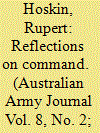

|
|
|
| 10 |
ID:
158220
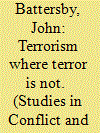

|
|
|
|
|
| Summary/Abstract |
Despite many commonalities in national security priorities, Australia and New Zealand approach the threat of terrorism quite differently. Both had twentieth-century manifestations of domestic terrorism which were generally downplayed. The emergence of jihadist-inspired threats globally have affected Australia much more than New Zealand, and Australian counterterrorism strategy has developed significantly since 9/11. New Zealand has watched global events so far untouched by any jihadist threat, and has implemented few effective counterterrorism measures. The reasons for the differing experience, it is contended here, are the varying historical perceptions of threat, and consequent differing approaches each country has taken to mitigate perceived threat.
|
|
|
|
|
|
|
|
|
|
|
|
|
|
|
|